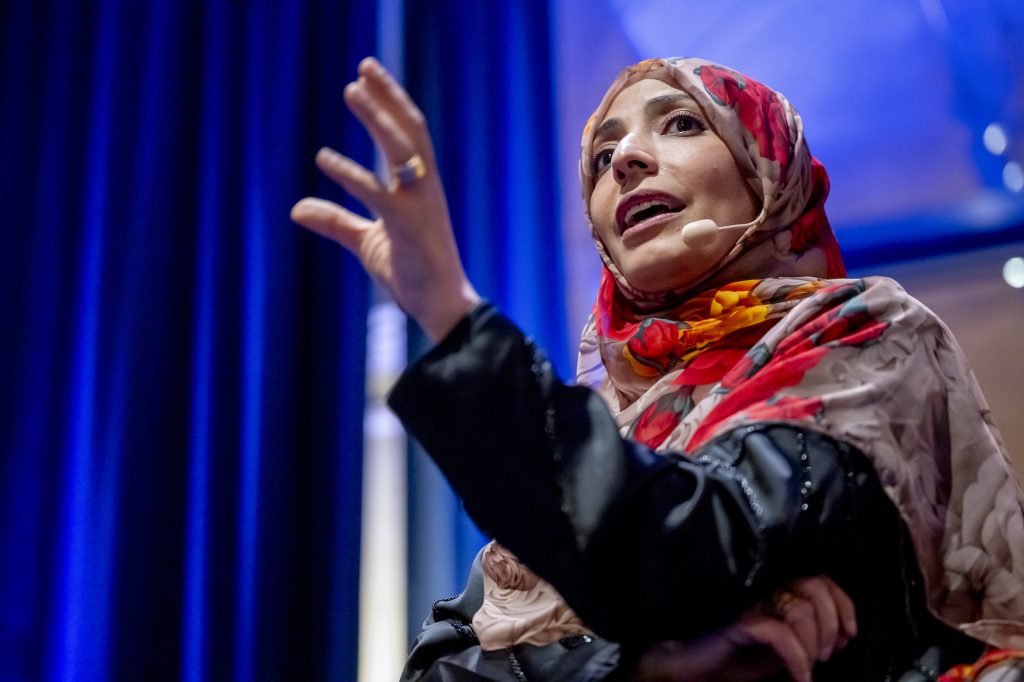This October, the Nobel Prize Dialogue makes its debut in Sydney, uniting leading thinkers from science and beyond, to explore and discuss the future of decision-making. The evening event at UNSW Sydney will feature engaging conversations between three Nobel Prize laureates: peace laureate Tawakkol Karman and physics laureates Saul Perlmutter and Brian Schmidt. Writer, composer and advocate for critical thinking Tim Minchin will also be on stage, alongside other prominent regional and international experts.
The discussion will centre around decision-making. Humanity evolved thanks in large part to our ability to cooperate with one another. However, in a world where the deep problems of war, threats to democracy and climate change are sowing chaos, our collective decision-making processes need to evolve.
The Nobel Prize Dialogue at UNSW Sydney will explore how our choices are shaped, do we truly have free will, and what are the opportunities and threats we face from artificial intelligence?
UNSW Vice-Chancellor and President Professor Attila Brungs said it’s an honour that UNSW has been selected to host this event.
“To have three Nobel Prize laureates on stage together will be a unique opportunity to hear from some of the planet’s brightest minds on how we can tackle society’s most fundamental problems,” he said.
Sandra Brandin, Acting CEO of Nobel Prize Outreach, expects the three laureates will enlighten audiences.
“In a year of elections worldwide and a concerning decline in democracy, the theme of decision-making is more relevant than ever,” she said. “We are thrilled to bring this event to Australia for the first time and partner with UNSW.”
Professor Verity Firth AM, UNSW’s Vice-President Societal Impact, Equity and Engagement, said the event offers students, staff and the broader community a chance to hear from some of the world’s most distinguished scholars.
“In this age of misinformation, we must equip ourselves for a future where the line between fact and fiction is increasingly blurred. Universities have a vital role to teach critical thinking and help society distinguish between trustworthy and non-trustworthy information so that we learn how – not what – to think,” she said.
The Nobel Prize Dialogue Sydney is a free event. It will be held at UNSW Sydney on Thursday, 24 October, 6pm – 8pm at the Clancy Auditorium. The theme is “The Future of Decision Making”.
More information about the event: https://www.nobelprize.org/events/nobel-prize-dialogue/sydney-2024/
Press accreditation
Media are invited to the event and can request interviews.
Please reach out to [email protected] or contact UNSW Media, [email protected]
Event program
Decision-making for the greatest benefit to humanity: Brian Schmidt
Nobel Prize laureate Brian Schmidt will lay out the new risk landscape and how we can navigate it.
Democracy reimagined: New thinking for the 21st century: Tawakkol Karman and UNSW constitutional law expert Megan Davis
Cooperation is humanity’s superpower, but we take it for granted at our peril. Around the world, democratic principles are being undermined while many voices are ignored.
Facts, fiction and critical thinking: Saul Perlmutter and Tim Minchin
The ability to think critically is essential to make good decisions and to solve some of the world’s most intractable problems. Saul Perlmutter believes everyone can learn the critical thinking skills scientists use every day, and he’ll be joined by writer and composer Tim Minchin to discuss how it can be used to grow creativity and curiosity.
Live performance from rapper and UNSW alumni Dobby.
About the Nobel Prize laureates
Tawakkol Karman, a Yemeni journalist and human rights activist, is the first Arab woman to receive the Nobel Peace Prize in 2011. Known as the “Mother of the Revolution,” “The Iron Woman,” and “The Lady of the Arab Spring,” Karman led hundreds of protests against Yemen’s dictatorial regime, advocating for democracy and freedom of speech. She founded Women Journalists Without Chains and the Peaceful Revolutionary Youth Council, facing imprisonment and persecution for her active engagement in these causes. Her Tawakkol Karman Foundation plays an important role in development by building schools, fighting poverty, and supporting health institutions in Yemen.
Saul Perlmutter shared the physics prize for the discovery of the accelerating expansion of the universe. He is a professor of physics at the University of California, Berkeley, and a senior scientist at the Lawrence Berkeley National Laboratory. His interest in scientific-style critical thinking inspired interdisciplinary courses for undergraduates called Sense & Sensibility & Science and Physics & Music, which he has taught for more than a decade. An author of hundreds of articles on cosmology, Perlmutter has also written popular articles and appeared in a number of documentaries.
Brian Schmidt is Distinguished Professor of Astronomy at the Australian National University. As leader of the High-Z SN Search team, he was awarded the 2011 Nobel Prize in Physics jointly with Adam Riess and Saul Perlmutter, for his work on the accelerating universe. Schmidt has worked across many areas of astronomy including studying supernovae, gamma ray bursts, gravitational wave transients, exo-planets, and metal poor stars. Schmidt completed joint undergraduate degrees in astronomy and physics at the University of Arizona (1989), an astronomy master’s degree (1992) and PhD (1993) from Harvard University. After a postdoctoral fellowship at the Harvard-Smithsonian Center for Astrophysics, he joined the staff of the Australian National University in 1995. He served as the 12th Vice Chancellor and President of the Australia National University from 2016-2023.
About the event
The Nobel Prize Dialogue is an open, cross-disciplinary meeting bringing together a unique constellation of Nobel Prize laureates, world-leading scientists, policy makers and thought leaders to discuss global issues that affect us all. The Nobel Prize Dialogue is free to attend and accessible to a worldwide audience online. The conference is inspired by the Nobel Week Dialogue, which has been taking place in Sweden since 2012 on the day before the Nobel Prize award ceremony.
Nobel Prize Dialogue is organised by Nobel Prize Outreach and the UNSW Sydney, with the support of Nobel International Partners 3M, ABB, EQT, Scania and Stegra.
